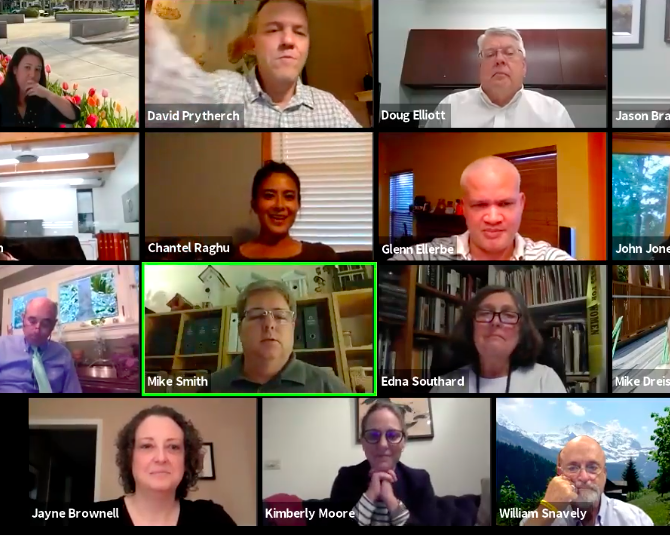Council passes ordinance with heavy fines for mass gatherings
Oxford City Councilor Jason Bracken could hear a party going on through his window while council debated an ordinance to crack down on such events, during the virtual Aug. 18 meeting.
August 21, 2020
Concerned that large parties held by returning Miami University students may spark a COVID-19 outbreak, Oxford City Council passed an emergency ordinance this week.
The Oxford City Council is calling for heavy fines against hosts and guests of social gatherings of more than 10 people not living in the same household.
Councilor David Prytherch, who introduced the legislation at the Aug. 18 meeting, said the purpose of the ordinance is to limit potentially dangerous social gatherings.
“The stakes couldn’t be higher for Oxford, our key employer Miami University, and the public health to contain COVID-19,” Prytherch said.
A single infectious person attending such a party could spread the virus to everyone there, causing those people to infect their contacts. Such a widespread outbreak could lead to the University shutting the campus down for an entire semester. In addition to people being sick, there could be significant economic repercussions for the city if the University has to lay off staff.
“It may already be too late,” said Councilor Jason Bracken, who noted that the University is investigating 19 parties that were reported the previous weekend.
While many students living off campus have returned to Oxford, all classes are currently being taught online. Face-to-face classes are scheduled to begin Sept. 21, with freshmen and those using University housing being allowed back into the dormitories starting Sept. 14.
Those found violating the new ordinance will be subject to a civil penalty of $500. For any subsequent violations, this civil penalty will be raised to $1,000.
The ordinance exempts restaurants and bars, University classes, factories and warehouses, grocery stores, community and sporting events, and religious gatherings.
Bracken voiced concerns regarding the penalty being too inconsequential and suggested the council should consider making the fines as high as $5,000 to deter people from holding parties. Bracken, attending the virtual meeting from his Oxford home, said he could hear a party going on through his window as the council was meeting.
But Bracken later joined the unanimous vote that included the lower fines, following the advice of Law Director Christopher Conard and Police Chief John Jones, who said officers might be hesitant to issue citations that carried such large fines for a civil violation.
Jones noted that police already have the ability to cite people under a nuisance party ordinance. Miami also has the option to discipline students cited for violation of state and local COVID-19 safety regulations that already limit gatherings of more than 10 people. The University is already investigating several parties, Kimberly Moore, Miami’s dean of students, told the council at the meeting.
“For a child who attends (Miami) and comes from a family of means, is a civil penalty of $500 or $1,000 going to be a consequence? Probably not, but suspension or expulsion will be,” Conard said, “I’ve represented a number of students who’ve been involved in situations with discipline at various Universities throughout the state, and can tell you, when you start talking about suspension, no academic credit, no tuition refund, it doesn’t matter how much money you’ve got, you’re not happy to hear that consequence.”
Prytherch thanked the Oxford Police Department for taking on the responsibility of stopping mass gatherings from occurring.
“We’re not only asking (OPD) to do something kind of difficult and painful (write a $500 ticket), we’re asking them to enter into a potential infectious situation,” Pythrerch said. “Police are first line responders in an era of pandemic, so I’m grateful for the Oxford Police Department and think Miami University ought to be grateful.”
The Emergency Ordinance would end automatically whenever the state’s executive order declaring a COVID-19 emergency expires, which is not expected to happen until a vaccine is developed and distributed.














